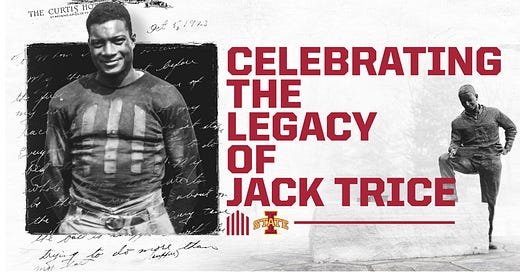I WILL: Iowa State honors the legacy of Jack Trice 100 years after his death
Jack Trice, the first Black student-athelete at Iowa State, died of injuries sustained in a football game against Minnesota 100 years ago, His legacy grows stronger over time
“I will.”
Those iconic words echoed through a poignant and powerful letter Jack Trice — Iowa State’’s first Black student-athlete — penned on the eve of his first major college football game at Minnesota.
Trice vowed to selflessly perform at a peak level against the Gophers, which he did until being trampled after throwing a roll block. He eventually died of those injuries. He was just 21.

“The honor of my race, family, and self are at stake,” Trice wrote in the letter. “Everyone is expecting me to do big things. I will! My whole body and soul are to be thrown recklessly about on the field tomorrow. Every time the ball is snapped I will be trying to do more than my part.”
It’s likely Trice was targeted on the play, either because of his race, or his status as a star player. Perhaps it was a combination of the two.
But at any rate, Trice’s career as a Cyclone had been cut tragically and brutally short, and thousands attended his memorial service on campus in the coming days.
Then Trice’s story became largely forgotten. In the 1970s, a group of students and faculty advocated for ISU’s stadium to be named after him, but that push proved to be unsuccessful. Two decades later, the children of many of those activists revived the cause, and in 1997, Cyclone Stadium became Jack Trice Stadium. To this day, it’s the only FBS football venue to be named after an African American.
That’s a big deal — and one of many reasons Iowa State has paid tribute to him all week leading up to Saturday’s 7 p.m. Jack Trice Legacy Game against TCU.
But Trice’s legacy looms over the football program all season long. What he stood for — and what he faced in terms of racial oppression — is worthy of serious and ongoing scrutiny and discussion.
Here’s what Cyclone head coach Matt Campbell told me about Trice’s legacy during a side interview session on Tuesday:
“Okay, what is this story really about?” Campbell said. “And I think that is one of the things that makes Iowa State really special — (it) is that there are some real trailblazers that came here and created real change and stood for something. We talked about it in our team meeting (on Tuesday). Yeah, everybody gets a T-shirt. Everybody’s gonna wear this (Trice-era throwback) uniform, but you’re missing the point of this; where this young man who’s no different (from a lot of) you — can you imagine the courage that it took to, as a Black man, to leave inner-city Cleveland to come to what I’m sure at that time was all-white Ames, Iowa, and literally break the color barrier here? (He) gave hope to so many of you who are sitting in here, so many of your parents who had the opportunity to play college athletics, and this guy stood for something. And whatever happened, you know probably that something happened there that had to do with not just a football incident. It had to be bigger than that and this guy was literally willing to risk everything to create this powerful change in this world. I told our kids (last) Friday night, ‘There’s a great saying about who defines greatness. Well, history defines greatness and the character and the human — the impact on the human spirit, that can last the test of time, and we’re 100 years later celebrating the great courage of this man who changed the lives of so many other people we get a chance to interact with day in and day out. I think it’s just unbelievably powerful.”
That it is, coach. That it is.
Iowa Writers’ Collaborative Columnists
I’m honored to be among the many talented writers and artists on this list (below).
Please subscribe to the Iowa Writers’ Collaborative Weekly Round Up column:
Laura Belin: Iowa Politics with Laura Belin, Windsor Heights
Doug Burns: The Iowa Mercury, Carroll
Dave Busiek: Dave Busiek on Media, Des Moines
Iowa Writers’ Collaborative, Roundup
Steph Copley: It Was Never a Dress, Johnston
Art Cullen: Art Cullen’s Notebook, Storm Lake
Suzanna de Baca: Dispatches from the Heartland, Huxley
Debra Engle: A Whole New World, Madison County
Julie Gammack: Julie Gammack’s Iowa Potluck, Des Moines and Okoboji
Joe Geha: Fern and Joe, Ames
Jody Gifford: Benign Inspiration, West Des Moines
Rob Gray: Rob Gray’s Area, Ankeny
Nik Heftman: The Seven Times, Los Angeles and Iowa
Beth Hoffman: In the Dirt, Lovilla
Dana James: New Black Iowa, Des Moines
Pat Kinney: View from Cedar Valley, Waterloo
Fern Kupfer: Fern and Joe, Ames
Robert Leonard: Deep Midwest: Politics and Culture, Bussey
Letters from Iowans, Iowa
Tar Macias: Hola Iowa, Iowa
Alison McGaughey, The Inquisitive Quad Citizen, Quad Cities
Kurt Meyer: Showing Up, St. Ansgar
Wini Moranville: Wini’s Food Stories, Des Moines
Jeff Morrison: Between Two Rivers, Cedar Rapids
Kyle Munson: Kyle Munson’s Main Street, Des Moines
Jane Nguyen: The Asian Iowan, West Des Moines
John Naughton: My Life, in Color, Des Moines
Chuck Offenburger: Iowa Boy Chuck Offenburger, Jefferson and Des Moines
Barry Piatt: Piatt on Politics Behind the Curtain, Washington, D.C.
Dave Price: Dave Price’s Perspective, Des Moines
Macey Spensley: The Midwest Creative, Norwalk
Larry Stone: Listening to the Land, Elkader
Mary Swander: Mary Swander’s Buggy Land, Kalona
Mary Swander: Mary Swander’s Emerging Voices, Kalona
Cheryl Tevis: Unfinished Business, Boone County
Ed Tibbetts: Along the Mississippi, Davenport
Teresa Zilk: Talking Good, Des Moines
The Iowa Writers Collaborative is also proud to ally with Iowa Capital Dispatch.



